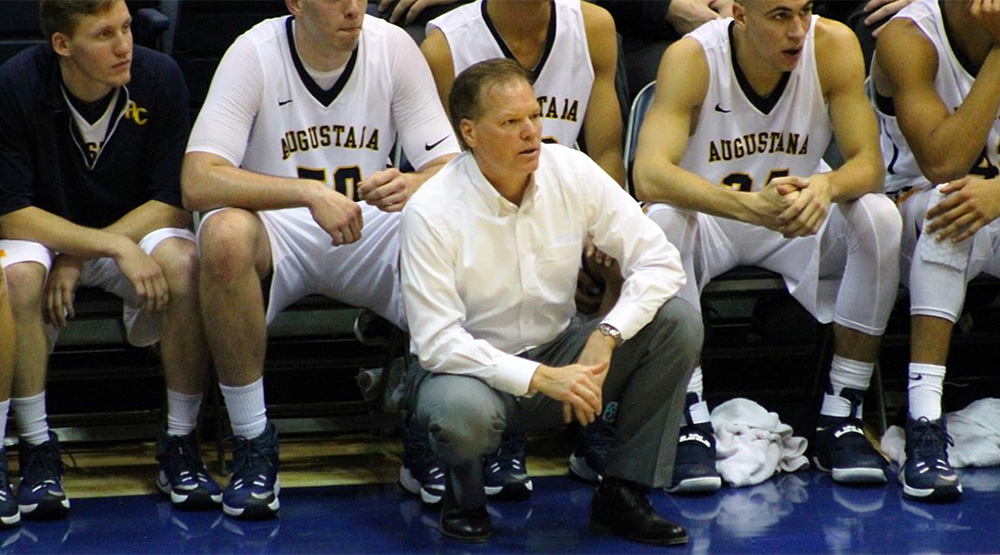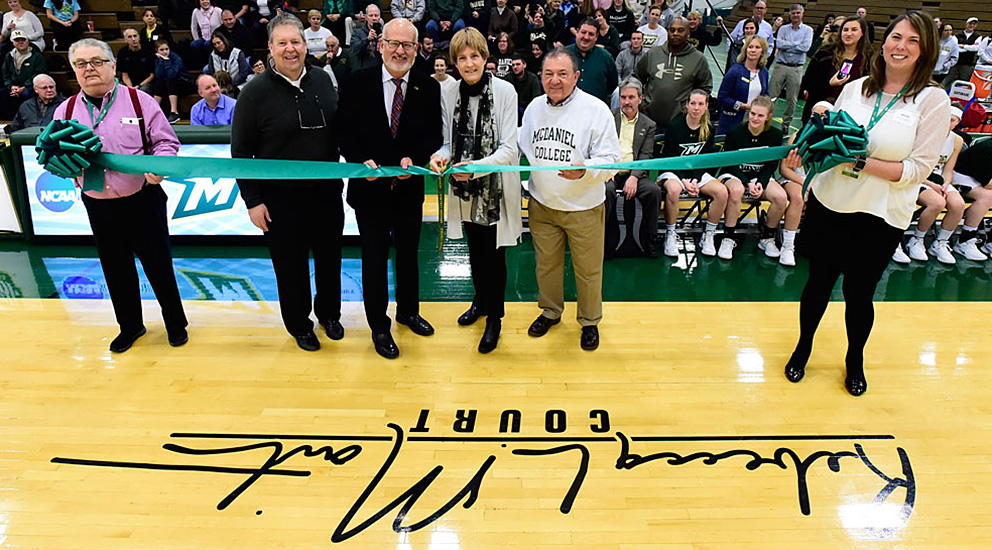
|
| Grey Giovanine has his team at the top of the CCIW and the Central Region while he's fighting a much bigger opponent. Augustana athletics file photo |
By Ryan Scott
D3sports.com
Coaches vs. Cancer has become ubiquitous across the NCAA. Founded in 1993, this partnership between the National Association of Basketball Coaches and the American Cancer Society has raised more than $100 million and increased awareness in immeasurable ways. Many women’s teams raise money for the Kay Yow Fund, named for the former North Carolina State women’s basketball coach and a partner of the Women’s Basketball Coaching Association.
“The resources we have available [in Division III] makes it harder for us to do a lot financially,” says Chicago men’s coach Mike McGrath, who also helps organize the NABC All-Star Game, “While fundraising is the major emphasis, there are awareness events and we get tremendous buy-in from coaches at all levels.”
Awareness is very personal for McGrath; both of his parents died as a result of colon cancer and his sister was diagnosed at a very young age. “Luckily I don’t have the genetic mutation that makes you susceptible to colon cancer that’s prominent in my family, but I’ve been getting colonoscopies annually starting at the age of 29.”
McGrath adds: “Until it strikes home, until you know, until people share, you just don’t think about it. I had to think about it for the wrong reasons, but if others can think about it more proactively the better chance you have of beating something like that.”
You may have noticed your coach with unusual footwear for a game or two in January. One of the highest profile Coaches vs. Cancer events is Suits and Sneakers week, where coaches look a little more ready to suit up than normal as a means of raising funds and awareness.
Lacing up those sneakers was a little different this year for Augustana men’s coach Grey Giovanine, who was diagnosed with prostate cancer in January and will undergo surgery in March. “We’ve tried not to focus on it too much this year,” says Giovanine, “But when I walked into the locker room the week coaches wear their sneakers with my sneakers on, I looked at my players and they looked at me.
“We nodded, knowing it’s different now.”
Like the coach he is, Giovanine has embraced this diagnosis as an opportunity for education and awareness. “I didn’t tell the team until I was scheduled for the biopsy [in January] and thought I might miss a practice. But it’s a small community and eventually it became something people were asking about, so rather than having misinformation out there, I decided to be proactive.”
The coach talked to the local newspaper beat reporter, who published a story, and that night all three TV networks did long stories on it. A coach has a bigger platform than most, especially at Augustana, which gets a lot of media exposure in the Quad Cities, the 90th-largest metropolitan area in the country.
Giovanine is intentional about using his to advocate health and prevention, an issue that’s very close to his heart. “My father- in-law had prostate cancer and succumbed to it because of his hesitation to get it diagnosed and treated. It’s treatable. If you get diagnosed it’s a bump in the road; if you ignore it, it can be terrible.”
Since the public announcement, Giovanine has been bombarded with well-wishes from friends and strangers alike, many with stories of cancer and survival. “My general practitioner called [after the news stories] and said ‘you’ve done more for prostate cancer screenings in 48 hours than I’ve been able to do in 20 years.’ There’s no reason for people to succumb to this disease when it is detectable and treatable. If you’ve had cancer in your family at all, you’re high risk; it’s important to be on top of things.”
Facts and transparency are the means by which Giovanine is attempting to prevent his cancer from being a distraction to his team, one of the best in Division III. “I told them the bad news that I have cancer, but that it’s treatable and doesn’t have to be addressed until after the season” he says, “I did not want this to detract from the team.”
If you ask, Giovanine will give you a detailed list of his appointments, diagnosis, and treatment plan. Having all the facts laid out plainly helps put prostate cancer in perspective and avoid unnecessary fears.
“I gained a greater appreciation for my faith, my family, and my career,” says Giovanine. “When I was waiting – for the biopsy and the diagnosis and everything – what really saved me was the two hours with our players and coaches. It’s the best medicine you could possibly have. I don’t take for granted that I get to go out on that floor every day.
“My father was a legendary high school coach, but it was his illness in the end that helped him affirm that he had lived a meaningful life, because when he got sick he heard from so many people whose lives he’d impacted. That’s what I’ve gone through in the last 72 hours – not just friends, but acquaintances and strangers even; it’s humbling.”
The elder Giovanine survived prostate cancer, but ultimately succumbed to pancreatic cancer.
It’s the same diagnosis that blindsided McDaniel women’s coach Becky Martin last summer. “[The pain] started on the bus ride home from our last game,” says Martin, “I gutted through it for a couple days, but wasn’t really feeling any better.” Blood tests at the doctor led quickly to the hospital and, after ten weeks of persistence, finally a correct, but difficult diagnosis. “They told me it was incurable and that changed everything.”

|
| Becky Martin has devoted her life to Western Maryland, then McDaniel College, and last month McDaniel dedicated its basketball court to her. McDaniel athletics photo |
Pancreatic cancer is one of the most deadly and pernicious – difficult to detect and even harder to treat. “It’s basically a death sentence, which is a tough pill to swallow,” says Martin. “From the beginning our focus was on quality of life.”
What a life it’s been so far! Martin grew up in Westminster, Maryland, home of McDaniel (formerly Western Maryland). “Western Maryland was the last school on earth I wanted to attend because it was in my hometown,” says Martin. “I’ve been in payback and pass-it-on mode since the day I graduated – I had a phenomenal experience; it was a gift and it changed my life and I wanted that for my student athletes.”
Martin has been at McDaniel pretty much since she started as a freshman, coaching 37 seasons and amassing 554 wins thus far. Throughout our interview, she spoke only of her players and community, saying, “I don’t want them to have to think about [cancer], to go through the pain, the mourning. The hardest part is accepting help from others.”
The campus has been incredibly supportive, with former players and assistants stepping in to coach the team in her stead. On Jan. 19, McDaniel renamed the floor of the Gill Center, Rebecca L. Martin Court. “I was blown away. It was just beyond comprehension, so wonderful and amazing, It’s a day I’ll always cherish and remember,” says Martin, “Alumni day has always been one of my favorite days of the year, because that’s the day my girls come home.”
Martin has always been a mother to her players and continues to lead as she faces the grim prospect in front of her. “Life throws you a lot of adversity, but it’s how you handle and grow from those experiences that makes you who you are. It’s a lesson I’ve always tried to teach.”
It’s the lesson she’s now trying to live by example. “I’m a competitor,” says Martin, “I plan on making it to that one year anniversary – only six or seven percent of people with pancreatic cancer make it that first year – and we’re closing in on a year. One of my former players said they wanted [the court dedication] to be ‘in honor’ and not ‘in memory.’ I’m so grateful that I was able to be here to be a part of it.”
In a society that tends to avoid and cover up difficult subjects, Martin is a true example of perseverance and living life with purpose. She continues to attend as many games as possible and occasionally makes her presence known to players and referees alike. “I love to travel and I love the outdoors,” says Martin, “Taking a 10-mile hike or rafting down the Colorado River is not part of those plans anymore, but I can go to an overlook and enjoy the view.”
The odds are Becky Martin will not have the retirement she once envisioned for herself. She is doing the hard work of coming to terms with an incredible injustice. Healthy, hard-working, caring, and dedicated people aren’t supposed to get incurable cancer. Prostate cancer was once much deadlier than it is today and so many people in the Division III world are working hard to make sure that’s the story for more and more types of cancer in the future.
Grey Giovanine knows the power of prevention first hand and is working to spread the word. Coaches vs Cancer and the Kay Yow Fund, inspired by the struggles of their own members, seek to bring awareness and much-needed money for research to defeat the great scourge of cancer.
Becky Martin is showing, once again, how to live life well – both the highs and the lows. “It’s always been so much bigger,” she says. “I want to win and I’ve enjoyed every win and every trip to the NCAA Tournament, but it’s always been bigger. You’re a parent to these students. You want them to enjoy life, to grow, and enjoy all the good that life has to bring and to be successful. Seeing them succeed brings me great joy.”
As we head into the trials and travails of a turbulent postseason, may we all remember that it’s about more than just basketball.
